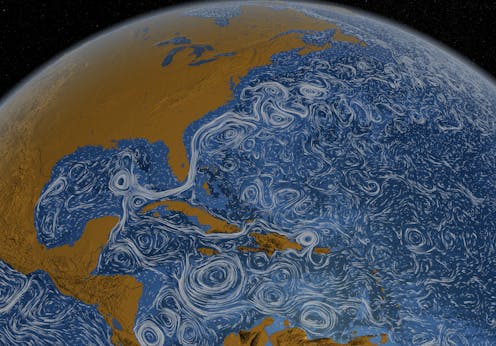Groundbreaking studies of Earth's churning oceans recognised at Australia's most prestigious science prizes this year
- Written by Signe Dean, Science + Technology Editor, The Conversation

This year, Australia’s prestigious Prime Minister’s Prize for Science has been awarded to a physical oceanographer whose work has had a “transformative impact” on our understanding of Earth’s oceans.
Professor Trevor McDougall AC from the University of New South Wales has made major contributions to unveiling the fundamental physics of the ocean.
During his illustrious career, McDougall has discovered previously unknown ocean mixing processes – the turbulent ways seawater churns and irreversibly changes[1] under various conditions.
His discoveries have improved climate models, allowing us to better predict our planet’s fast-changing future.
“The ocean is notoriously difficult to observe; we know more about the surface of the Moon than we do about the seafloor,” McDougall said.
“We study the ocean because it transports a lot of heat from the equatorial regions towards the poles and also because it acts as the thermal flywheel of the climate system.”
A world-leading authority on ocean mixing, McDougall was recognised for his many contributions, including a redefinition of the thermodynamic description of seawater. The latter was accepted by[2] the Intergovernmental Oceanographic Commission in 2009 as a new international standard.
“To receive the Prime Minister’s Prize for Science is an incredible honour, and it’s also an honour for the early career researchers that I’ve been working with for the past ten years,” said McDougall.
“They’ve been integral to some of the results that have been recognised in this prize.”
Read more: The ocean is becoming more stable – here's why that might not be a good thing[3]
Predicting sea level rise
Earth’s oceans and their role in climate change are also the focus of another prize recipient this year – physical oceanographer and ocean modeller Dr Adele Morrison from the Australian National University (ANU).
She won the Malcolm McIntosh Prize for Physical Scientist of the Year for her innovative methods of modelling ocean circulation around Antarctica.
Morrison’s research has greatly reduced uncertainty in predicting future sea level rise from Antarctic ice sheet melt, driven by warm ocean currents in the Southern Ocean.
Such work is particularly pertinent to Australia, with 85% of Australians living in places that could soon be affected by rising sea levels.
Morrison hopes to “inspire the next generation of scientists to unravel new discoveries and technologies that limit the impacts of climate change and our transition to a zero-emissions world”.
Read more: Satellites reveal ocean currents are getting stronger, with potentially significant implications for climate change[4]
Molecular diagnostics and solar cell improvements also recognised
Several other researchers and inventors received accolades at the ceremony held on November 21 at Parliament House in Canberra.
Adjunct Professor Alison Todd and Dr Elisa Mokany, co-founders of the molecular diagnostics company SpeeDx, received the Prize for Innovation. Their highly advanced diagnostic tests have improved diagnosis and treatments for several infectious diseases and cancers.
The other Prize for Innovation went to Dr Nick Cutmore, Dr James Tickner and Mr Dirk Treasure of the company Chrysos. They have successfully commercialised an X-ray technology that measures the presence of gold and minerals in ore samples.
Professor Si Ming Man from ANU was awarded the Frank Fenner Prize for Life Scientist of the Year for his work on inflammation and new therapies for inflammatory diseases.
The Prize for New Innovators went to University of Melbourne’s Dr Pip Karoly, whose unique seizure forecasting technology is improving the lives of millions of people with epilepsy.
UNSW Associate Professor Brett Hallam was also awarded the Prize for New Innovators, whose discoveries and patented tech have improved solar cell performance by a whopping 10%.
Inspiring our youngest future scientists
Each year, the prizes also include recognition for outstanding achievements in science teaching.
Mr George Pantazis from Marble Bar Primary School in Western Australia was awarded the Prize for Excellence in Science Teaching in Primary Schools for his work integrating First Nations cultural knowledge, including the critically endangered Nyamal language, in the school’s science, technology, engineering, and mathematics (STEM) program.
This “wouldn’t be possible without the support of our teachers and the community, in particular the Nyamal people and their Elders”, said Pantazis.
“This prize is the highlight of my career. I owe it all to the students. Without them, I have nothing.”
The Prize for Excellence in Science Teaching in Secondary Schools went to Ms Veena Nair from Viewbank College, Victoria. She has collaborated with countless academics and industry leaders to not only show students the practical application of STEAM (science, technology, engineering, arts and mathematics) subjects, but also find pathways for them in STEAM careers.
“As a first-generation migrant, I’m deeply thankful to my birth country India, where I got my foundation skills – and to my adopted country Australia, where I was given the wings to fly,” said Nair.
For 23 years now, the Prime Minister’s Science Prizes have been awarded for outstanding achievements in scientific research, research-based innovation and excellence in science teaching. The recipients share a prize pool of $750,000.
This is the first year since 2019 the prizes were held at the Parliament House again, with the 2020 and 2021 events having taken place virtually.
Read more: Explainer: what's the difference between STEM and STEAM?[5]
References
- ^ irreversibly changes (www.uib.no)
- ^ was accepted by (csiropedia.csiro.au)
- ^ The ocean is becoming more stable – here's why that might not be a good thing (theconversation.com)
- ^ Satellites reveal ocean currents are getting stronger, with potentially significant implications for climate change (theconversation.com)
- ^ Explainer: what's the difference between STEM and STEAM? (theconversation.com)
















